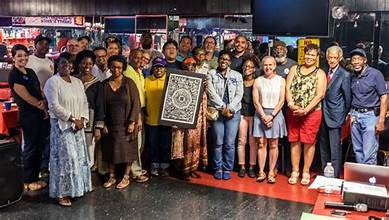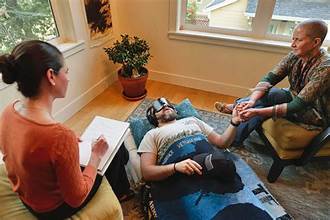Program Description
- ✔️ 60 Hours live online classes *Prior learning credit available for accelerated program
- ✔️ 60 Hours self-paced online classes
- ✔️ 40 Hours live in-person intensive practicum
- ✔️ Program Duration: 10 weeks
Curriculum Breakdown

Historical, Traditional, and Contemporary Practices and Applications (12 Hours)
- Historical, traditional, and contemporary practices and applications
- Current and historical use of plant and fungal medicines in Indigenous and Western cultures
- The Controlled Substance Act and its effect on psilocybin research and drug policy
- Overview of historical and recent academic research
Cultural Equity in Relation to Psilocybin Services
(12 Hours)
- Cultural equity and its relationship to health equity and social determinants of health
- Racial justice, including the impact of race and privilege on health outcomes and the impact of systemic racism
- The impact of drug policy on individuals and communities
- History of systemic inequity, including inequity in healthcare, mental health, and behavioral health services
- Intergenerational trauma
- Responsible referral and support

Safety, Ethics, and Responsibilities
(12 Hours)
- Awareness of facilitator's personal bias, including examination of motives
- Training on the Oregon Psilocybin Services Act, scope of practice, and expectations of referral
- Ethical issues related to psilocybin facilitation, including:
- Oregon's Facilitator Code of Ethics
- Ethical considerations relating to equity, privilege, bias, and power
- Appropriate emotional and sexual boundaries between facilitators and clients
- Financial conflicts of interest
- Reasonable expectations regarding client outcomes
- Appropriate use of touch and client consent to physical contact
- Appropriate emotional and sexual boundaries between facilitators and clients both during provision of psilocybin services and at other times and potential harm to clients and consequences for facilitators for breaching those boundaries
- Accurate record keeping and client confidentiality>
- Historical and Contemporary abuse of power associated with psychedelics including sexual, emotional and physical abuse and implications for facilitators
- Awareness of new research related to safety and ethics of providing psilocybin services
- Appropriate measures to mitigate risks associated with psilocybin services including: harm reduction, de-escalation, and conflict resolution
- Appropriate measures to mitigate risks, including harm reduction, de-escalation, and conflict resolution
- Accurate record keeping and client confidentiality
- Awareness of new research related to safety and ethics of providing psilocybin services
- Appropriate measures to mitigate risks associated with psilocybin services including: harm reduction, de-escalation, and conflict resolution

Psilocybin Pharmacology, Neuroscience, and Clinical Research
(4 Hours)
- Pharmacodynamics and pharmacokinetics of psilocybin
- Drug and supplement interaction
- Primary effects and mechanisms of psilocybin on the brain, including connectivity and serotonin receptor activation
- Key areas of psilocybin research
- Models of substance use, addiction, and recovery
- The metabolism of psilocybin and psilocybin products including concentration of psilocybin and psilocin in available psilocybin products

Core Facilitation Skills
(16 Hours)
- Client communication, empathy and rapport, including a nondirective facilitation approach, cultural attunement and a nonjudgmental disposition
- Response to psychological distress and creating a safe space for difficult emotional experiences
- Physical reactions and side effects of psilocybin
- Trauma informed care including physiology of trauma, vicarious trauma, empathetic stress and compassion fatigue
- Identification and facilitation of a variety of subjective psilocybin experiences including experiences related to physiological sensations, cognitive, emotional and mystical states, and traumatic memories
- Appropriate modes of intervention, understanding when intervention is necessary and when a client may need a higher level of care
- Recognizing and addressing adverse behavioral reactions and adverse medical reaction
- Identification of the unique health, psychological and socio-cultural presented by persons with terminal illness; and awareness of the appropriate knowledge, skills and approach needed to provide safe facilitation to such persons in a manner consistent with client goals, values, heritage and spiritual practices
- Repressed trauma emerging during a psilocybin experience
- Trauma and traumatic stress resulting from systemic oppression
- Safety for trauma resolution and risks associated with re-traumatization
- Protocols for ensuring facilitator safety and responding to emergencies
- "Set and Setting" including environmental considerations for administration sessions such as lighting, sound and temperature
- Completion of administration session

Preparation and Orientation
(16 Hours)
- Informed consent
- Client information form and intake interviews, including discussion of client's reasoning for seeking psilocybin services
- Using the client information form to assist clients in identifying benefits of referral to specialized treatment services
- Facilitator role and the limits of facilitator's scope of practice
- Trauma informed communication skills
- Identification of client safety concerns including: medical history, contra-indicated medications, and psychological instability
- Appropriate strategies to discuss client safety concerns including but not limited to identification of client's support system
- Determination of whether a client should participate in an administration session
- Client-directed safety planning to address identified safety concerns
- Boundaries between the facilitator and the client including use of touch
- Understanding of how racial and cultural dynamics affect interactions between client and facilitator
- Historical and indigenous modalities of preparation

Administration
(20 Hours)
- Dosing strategies and considerations including:
- Experiential differences relating to different dosages
- Physiological considerations in relation to dosage
- Delivery mechanisms of psilocybin
- Uses of secondary doses
- Effectively working with challenging behaviors during an administration session including:
- Unexpected client disclosures
- Substance-induced psychosis
- Suicidality
- Traumatic stress and its manifestation during a psilocybin experience and appropriate facilitator response including:
- Trauma's relationship to the body
- Repressed trauma emerging during a psilocybin experience
- Trauma and traumatic stress resulting from systemic oppression
- Safety for trauma resolution and risks associated with re-traumatization
- Protocols for ensuring facilitator safety and responding to emergencies
- "Set and Setting" including environmental considerations for administration session such as lighting, sound, and temperature
- Completion of administration session

Integration Mastery
(12 Hours)
- Identification of appropriate resources that may assist clients with integration including resources for:
- Interpreting feelings and emotions experienced during administration sessions
- Facilitation of positive internal and external changes
- Enhancement of existing supportive relationships
- Identification of client safety concerns
- Discussion of appropriate intervals between administration sessions and related safety concerns

Group Facilitation
(16 Hours)
- Skills required to facilitate psilocybin group sessions including but not limited to:
- Assessing client's compatibility with a group format
- Set and Setting for group facilitation
- Facilitating group communications and dynamics including strategies for working with multiple facilitators
- Group agreements including confidentiality and safety
- Identifying when a client within a group requires individual support, removal from a group, or additional intervention
- Group preparation sessions
- Group integration sessions
- Regulatory requirements for group facilitation

In-Person Practicum
(40 Hours)
During the in-person Practicum, students will come in person to our campus or one of our auxillary site locations to engage in hands-on training for individual and group facilitation including:
Preparation, client screening, client intake, conducting an administration session, core facilitation skills, integration methodologies